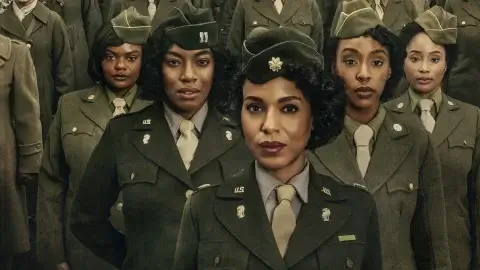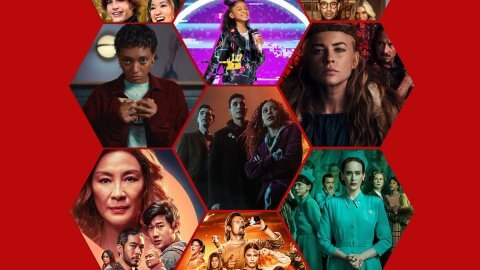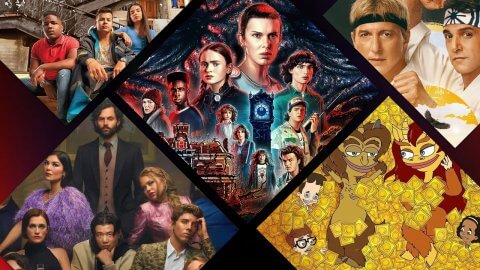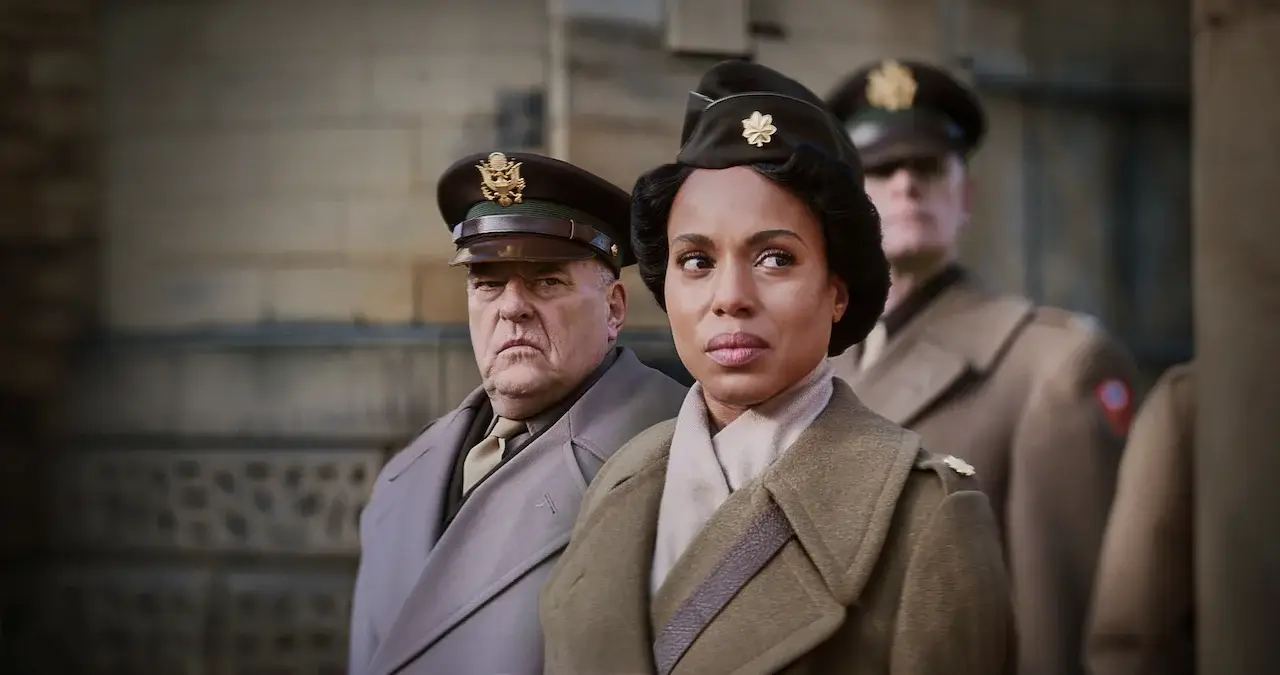
Dean Norris and Kerry Washington in The Six Triple Eight – Picture: Netflix
Based on the WWII History Magazine article “Fighting A Two-Front War” by Kevin Hymel, The Six Triple Eight presents the heroic true story of the 6888th Battalion who delivered hope – and millions of pieces of backlogged mail – to U.S. soldiers & families at the height of the war.
Written, directed, & produced by Tyler Perry (A Jazzman’s Blues, A Fall From Grace), the story focuses on the only all-black, all-female that served in Europe during World War II as they take on the massive undertaking of sorting & delivering a multi-year backlog of mail after it had been halted in the early 1940s due to supply chain shortages. Facing discrimination and military higher-ups wishing to see them fail, the unit – led by Major Charity Adams (Primetime Emmy winner Kerry Washington) – is determined to reunite families and give their fellow troops the connections they desperately need during a long & grueling overseas battle.
Alongside Kerry Washington, the film features many notable stars, including Oscar winner Susan Sarandon (Dead Man Walking, Thelma & Louise), TV & Film icon Oprah Winfrey (The Color Purple), Law & Order legend Sam Waterston, & Breaking Bad standout Dean Norris.
While these stars will draw the audience’s eye, the story’s gaze focuses more directly to the women of the Six Triple Eight; most notably, Private Lena Derriecott as portrayed by Ebony Obsidian (Sistas, If Beale Street Could Talk).
As a WWII tale about a battalion that never sees combat per se, it’s the task of writer/director Tyler Perry to take us to the fight within the fight; the battle for relevance, respect, & basic human decency from their fellow officers and soldiers; the battle inside themselves to not be baited into quarrels by racist men & women and keep calm in the face of wild displays of ignorance.
With Lena, Perry also gets to show the often stifled raw emotion of a person who’s been personally affected by the war itself; a person shattered by loss and motivated to make their tragedy have meaning. Lena puts a face to the piles and piles of packages & letters that never got to the families that needed to know whether their loved one is going to make it through or possibly read the last words of someone they held so dear.
The best moments of The Six Triple Eight lie not in the discoveries of sorting systems or making it through basic training, but in the personal struggles and the boiling over of the emotions that always live right near the surface but rarely break through in a military environment – especially one that actively tries to cut the legs from the black women of the 1940s.
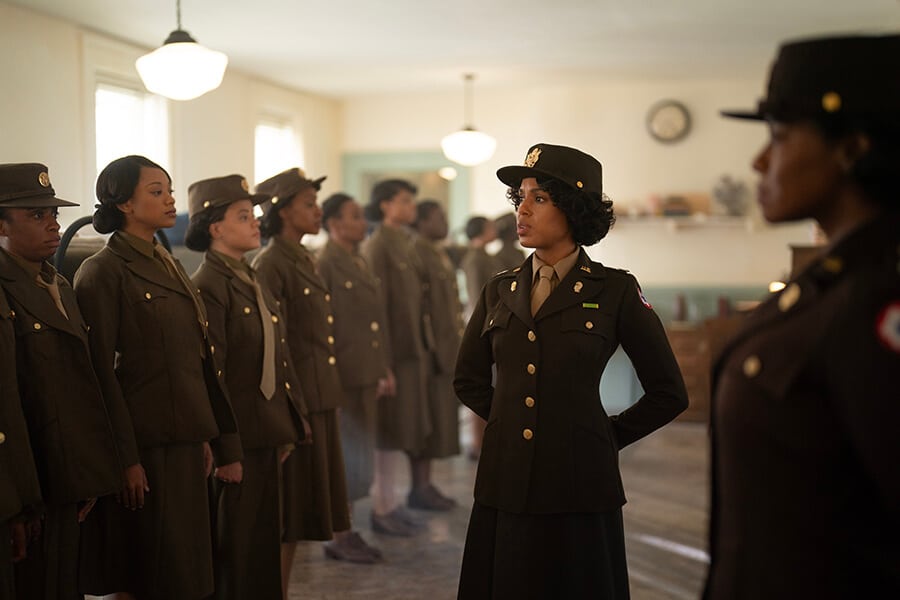
Six Triple Eight. Kerry Washington as Captain Charity Adams in Six Triple Eight. Cr. Bob Mahoney / Perry Well Films 2 / Courtesy of Netflix
As a director and writer, this film is a step up for Perry from his previous Netflix Original period piece drama, A Jazzman’s Blues, as he’s finally shifting into a less soapy, over-dramatized approach into something a little more measured; a mission critical story with doses of mostly necessary rallying points and heightened drama.
While the film could have used a little more visual flair, musical cues, & a tighter edit, Perry manages to construct a compelling enough personal narrative to overcome the limitations of a less than cinematic story on paper. The build to the “O Captain, my Captain” moment following the standoff between Washington’s Major Adams and Dean Norris’ General Halt is the best this film could expect to be; a recognition of devotion & sacrifice after a risky move that could have ended it all.
For all its trope-filled biopic trappings and the more improbable scenes, especially ones surrounding the White House, The Six Triple Eight delivers a watchable version of a story that most people would think to stay a history magazine article. Perry gives just enough personal connection, era-specific context, & historical importance to justify the leap to the screen. Washington, Obsidian, and just enough Shanice Shantay give life and compassion to these real-life characters who were undervalued in their role in history.
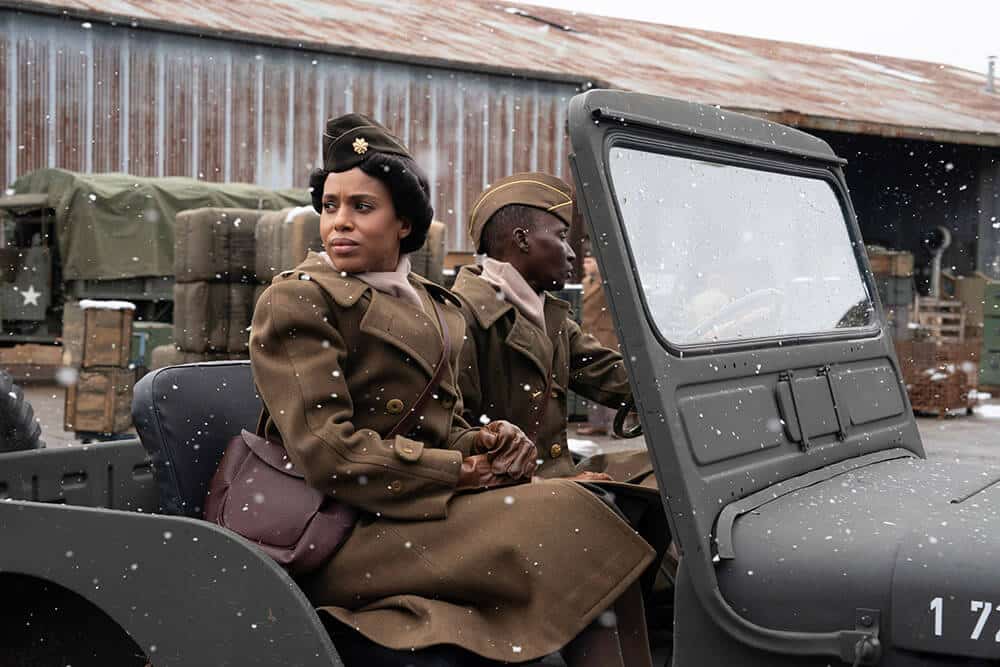
The Six Triple Eight. Kerry Washington as Major Charity Adams in The Six Triple Eight. Cr. Bob Mahoney/Perry Well Films 2/Courtesy of Netflix
Watch The Six Triple Eight If You Liked
- Hidden Figures
- Devotion
- A Jazzman’s Blues
- Shirley
- G.I. Jane
MVP of The Six Triple Eight
Kerry Washington & Ebony Obsidian
“855 women joined the war to fix the three-year backlog of undelivered mail.”
A more sarcastic read of that plot sentence would sound more like Allen Iverson in the early 2000s:
We’re talking about sorting mail? Two hours. You want me to spend two hours with you talking about … mail?
But writer/director Tyler Perry knew he needed to find what makes mail more than mail, what makes being a woman in the military in the 1940s so damn hard, & what makes a black woman’s experience that much harder. He also needed to have two strong black women to be the face for all of it.
With Washington, he gets a decorated veteran actress who can do confrontational & passionate characters in her sleep. Major Adams has to be strong, thick skinned, & compassionate in a time where most of her peers don’t have the time or respect for her existence.
With Obsidian, he gets a classic beauty and a gentle soul who can sell the heartbreak of a lost love and the strength to overcome it. When her crew discovers her true story and uncovers the last words written to her, it brings meaning to the entire project and life blood to the film as a whole.
The balance between these performances gives the best version of a complex story to convey to the average person, especially in the modern technological age.
A worthy story to tell with solid performances from Washington & Obsidian. Not entirely elevated above a quality streaming TV movie effort, but a worthwhile venture by Perry nonetheless.

